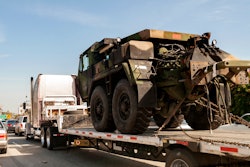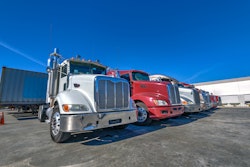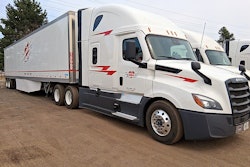The U.S. Senate Commerce Committee last month approved legislation (S. 357) that would, for the first time, mandate fuel economy improvements in medium- and heavy-duty commercial trucks. Under the bill, fuel economy regulation for large trucks would kick in beginning in the middle of the next decade. Average fuel economy would be required to rise by at least 4 percent a year. S. 357 still must be considered by the full Senate. The House has not yet acted on similar legislation.
Trucks entering the United States from Mexico though all land border ports in California, New Mexico and Texas now must transmit cargo information electronically through U.S. Customs and Border Protection. Soft enforcement will continue through June 19. After that date, carriers that don’t file electronically can be refused entry into the United States or incur penalties of up to $10,000. For more information, go to this site.
Freight Transportation Services Index rose 1.3 percent in March from the February level, rising after two monthly declines, the U.S. Department of Transportation’s Bureau of transportation Statistics reported. The rise was the largest monthly increase since May 2006. The March freight index of 109.1 was down 1.4 percent from its March 2006 level. Year-to-date, the freight index has climbed 0.6 percent.
California Air Resources Board asked the American Trucking Associations to gauge the preparedness of trucking operations for the state’s new idling law that takes effect Jan. 1, 2008. As of the date, the state’s five-minute idling limit will no longer exempt idling for the purpose of achieving mandatory rest in a sleeper. To take a survey on the matter, go to this site.
Container shipping into the United States rose 37 percent to almost 26 million containers from 2000 to 2005, the Bureau of Transportation Statistics reported. More than half – 15 million units – came from Canada and Mexico by truck or rail. The BTS report, “America’s Container Ports: Delivering the Goods,” is at this site.
PierPass says its OffPeak program has diverted more than five million truck trips from peak daytime traffic at the ports of Los Angeles and Long Beach since the program’s start in July 2005. Shippers moving containers at the two ports during peak daytime hours must pay a traffic mitigation fee, which helps fund five new nighttime and weekend shifts per week.
The Department of Transportation on April 30 announced that it would move ahead with a demonstration project that would allow a limited number of Mexican carriers to operate throughout the United States, but the House last month passed legislation (H.R. 1773) that would delay the expansion by throwing up numerous procedural hurdles. Unless Congress blocks the program through legislation or a limitation on funding, DOT is expected to move ahead with it in July. And the Owner-Operator Independent Drivers Association, the Teamsters Union, the Sierra Club, Public Citizen and the Environmental Law Foundation filed suit April 23 to block the project from going forward, citing procedural objections.
DOT may have uncut that lawsuit, however, by offering a month for public comment. DOT’s plan – outlined in the May 1 Federal Register by the Federal Motor Carrier Safety Administration – would allow up to 100 Mexico-domiciled motor carriers to operate throughout the United States for one year. At the same time, up to 100 U.S.-domiciled motor carriers will be granted reciprocal rights to operate in Mexico for the same period.
Participating Mexican carriers and drivers will be required to comply with all applicable U.S. laws and regulations, including those concerned with motor carrier safety, customs, immigration, vehicle registration and taxation, and fuel taxation, FMCSA said. In addition, the safety of the participating carriers will be tracked closely by FMCSA and its state partners, a joint U.S.-Mexico monitoring group, and an evaluation panel independent of DOT. For more information on FMCSA’s planned demonstration project, go to this site and search Docket No. 28055.
DOT emphasizes the simultaneous access of U.S. and Mexican carriers. “We are working to give American truckers an unprecedented opportunity to compete in a substantial new market,” said Secretary Mary Peters. “This announcement puts the program on track to lower costs for U.S. consumers, make our economy more competitive and give U.S. truckers new business opportunities.”
Reciprocal access would have been a political necessity anyway. The controversial emergency appropriation bill (H.R. 1591) to fund the Iraq War included a provision agreed to by the House and Senate that would withhold funding for expanded Mexican authority unless “simultaneous and comparable authority to operate within Mexico is made available to motor carriers domiciled in the United States.”
The funding provision also would require that any expansion of Mexican carrier authority comply with existing requirements governing pilot programs and, specifically, expansion of Mexican operations. The latter provision requires that the DOT Office of Inspector General certify U.S. readiness to ensure safe and compliant operations. Although H.R. 1591 was vetoed and the legislation has been mired in wrangling between Congress and the White House, the Mexican truck provision – or possibly a more stringent version – likely will be included in the final legislation.
DOT announced the demonstration project in the Federal Register after Congress adopted the Mexican truck provision in H.R. 1591, and the department appears confident its program would pass muster under the legislation. Peters noted, for example, that the DOT IG has certified that the pilot program meets eight criteria addressing inspector training, inspection facilities and the development of safety procedures.
Given this confidence on the part of DOT, critics of the Mexican truck expansion have advanced much more stringent legislation. On May 15, the House passed 411 to 3 legislation (H.R. 1773) sponsored by Rep. Nancy Boyda (D-Kan.) to add a number of new hurdles for DOT before it can grant expanded access. The bill would allow a three-year pilot program for up to 100 Mexican carriers. But before that could happen, H.R. 1773 requires DOT to:
· Disclose the funding levels needed to carry out the pilot program;
· Publish the findings of safety audits DOT has conducted within Mexico on potential participants in the pilot program;
· Detail the process to revoke Mexico-domiciled motor carrier operating authority under the pilot program;
· Identify measures to protect the health and safety of the public during the pilot program;
· Identify measures to enforce federal English language requirements;
· Establish standards to be used to evaluate the pilot program and compare any change in the level of motor carrier safety as a result of the pilot program;
· Set forth penalties to be levied against carriers who violate cabotage or are found to be conducting point-to-point service within the United States;
· Publish any motor carrier safety laws and regulations for which DOT will accept compliance with a Mexican law or regulation as the equivalent to compliance with U.S. standards; and
· Analyze any differences between Mexican laws and regulations and their U.S. equivalents, if Mexican laws or regulations will be accepted.
H.R. 1773 would establish an independent review panel of three individuals appointed by DOT to monitor and evaluate the pilot program. After evaluating the program, the panel would recommend changes or termination. DOT would have five days after receiving the recommendations to address adverse effects or terminate the program. The House-passed legislation also would require the DOT IG to monitor and review the program and submit reports.
“H.R. 1773 will not allow DOT to conduct a one-year pilot as a ruse, while unilaterally deciding how and when to open the U.S.-Mexico border,” said Rep. James Oberstar (D-Minn.), chairman of the full Committee on Transportation and Infrastructure. “Instead, the bill provides the U.S. with an opportunity to test, evaluate and learn from the impacts of allowing Mexico-domiciled trucks on our nation’s highways, but only once a strict set of prerequisites are met and only under a specific set of conditions.”
At presstime, the Senate Commerce Committee had not acted on H.R. 1773.
– Avery Vise
CCJ Hot Spots: Arkansas was hot in April
Illinois, Ohio and Arkansas were the nation’s strongest spot-market states during March, according to the latest CCJ Hot Spots data. Arkansas replaces Indiana, which had been one of the three top states for several months, along with the other two Midwest states. Loads into the Deep South typically commanded the highest spot-market rates from Illinois, Ohio and Arkansas in van, refrigerated and flatbed freight.
In cooperation with freight-matching leader TransCore, we highlight the nation’s three hottest states – those where the outbound load-to-truck imbalance is most in favor of the carrier. We then pair these states with market rate data to identify the three best outbound paying lanes by each of the three most popular equipment types – van, reefer and flatbed. And like the three origin states, each of these destination states have positive load-to-truck ratios. Load-to-truck ratio and market rate data are courtesy of TransCore. The goal is to highlight not only the best states for spot-market freight but also the best outbound opportunities from those states.
| Illinois (Outbound) | ||||||
| Destination State | Avg Rate | Min Rate | Max Rate | Avg Fuel Surcharge | Avg Accessorial | |
| Van | GA | 1.5396 | 1.3384 | 1.7408 | 0.3 | 232.97 |
| AL | 1.5244 | 1.3614 | 1.6874 | 0.26 | 198.57 | |
| MS | 1.4554 | 1.2944 | 1.6164 | 0.24 | 163.24 | |
| Reefer | AL | 1.9565 | 1.7876 | 2.1253 | 0.23 | 356.62 |
| MS | 1.8648 | 1.6266 | 2.103 | 0.19 | 279.06 | |
| GA | 1.8404 | 1.6259 | 2.0549 | 0.17 | 219.75 | |
| Flatbed | GA | 1.6605 | 1.4222 | 1.8987 | 0.12 | 118.74 |
| SC | 1.6455 | 1.4933 | 1.7977 | 0.05 | 136.4 | |
| MS | 1.6301 | 1.4704 | 1.7898 | 0.13 | 182.83 | |
| Ohio (Outbound) | ||||||
| Destination State | Avg Rate | Min Rate | Max Rate | Avg Fuel Surcharge | Avg Accessorial | |
| Van | GA | 1.4852 | 1.3308 | 1.6396 | 0.25 | 179 |
| AL | 1.4822 | 1.3152 | 1.6492 | 0.24 | 211.13 | |
| SC | 1.4761 | 1.3301 | 1.622 | 0.26 | 178.12 | |
| Reefer | GA | 1.7427 | 1.4845 | 2.0009 | 0.21 | 234.99 |
| AL | 1.6176 | 1.3407 | 1.8945 | 0.21 | 313.53 | |
| SC | 1.5723 | 1.4212 | 1.7235 | 0.16 | 215.27 | |
| Flatbed | AL | 1.7344 | 1.3824 | 2.0865 | 0.23 | 152.43 |
| WI | 1.7195 | 1.5089 | 1.93 | 0.08 | 58.69 | |
| SC | 1.692 | 1.4817 | 1.9024 | 0.05 | 33.7 | |
| Arkansas (Outbound) | ||||||
| Destination State | Avg Rate | Min Rate | Max Rate | Avg Fuel Surcharge | Avg Accessorial | |
| Van | GA | 1.576 | 1.3452 | 1.8069 | 0.25 | 157.25 |
| MI | 1.4994 | 1.353 | 1.6457 | 0.21 | 211.75 | |
| SC | 1.4741 | 1.3431 | 1.605 | 0.27 | 238.35 | |
| Reefer | GA | 1.9269 | 1.8129 | 2.0409 | 0.26 | 171.04 |
| SC | 1.7945 | 1.6102 | 1.9788 | 0.24 | 278.83 | |
| MI | 1.7458 | 1.5908 | 1.9008 | 0.32 | 436.45 | |
| Flatbed | GA | 1.6518 | 1.4374 | 1.8662 | 0.09 | 73.23 |
| MI | 1.6046 | 1.4221 | 1.7872 | 0.18 | 170.03 | |
| IN | 1.596 | 1.3091 | 1.8829 | 0.14 | 100.5 | |
Commercial ties not affected by Chrysler sale
The planned sale of Chrysler and its financing arm to a private equity firm apparently won’t change the company’s commercial offering – at least in the near term. Dodge and Freightliner both will continue to offer the Sprinter van, says Randy Jones, spokesman for Dodge’s commercial vehicle business. Likewise, the Dodge Ram 4500 and 5500 Chassis Cabs and the Sterling Bullet also will continue to share the same platform, Jones says.
Freightliner – which Daimler Benz already owned before the company’s purchase of Chrysler nine years ago – and Freightliner units Sterling, Western Star and Detroit Diesel are not affected by the transaction.
DaimlerChrysler announced May 14 that it will sell 80.1 percent of the Chrysler Group to New York-based private equity firm Cerberus Capital Management, L.P. for $7.4 billion – a fraction of the $36 billion Daimler Benz paid for Chrysler in the 1990s. But even the $7.4 billion figure is misleading as Daimler AG – the new name for DaimlerChrysler following the sale – will pay out to the Chrysler unit more than it receives from Cerberus.
Of the $7.4 billion, about $5 billion will go to the Chrysler Group industrial business and $1.1 billion will go to Chrysler’s financial services business to improve the equity position of both companies. DaimlerChrysler will receive the remaining $1.3 billion, although about $400 million of that will be loaned to the new Chrysler Corporation LLC.
Moreover, the deal commits DaimlerChrysler to transfer the industrial business of the Chrysler Group completely free of debt. DaimlerChrysler expects negative cash flow of more than $1.6 billion before the deal closes, so its net cash outflow from the deal would be close to $700 million, including the loan.
Although the deal effectively amounts to a giveaway, it accomplishes a huge objective for DaimlerChrysler: Fully eliminating the company’s pension and healthcare obligations for Chrysler employees. Under the deal, a new company, Chrysler Holding LLC, will be fully obliged for those liabilities.
Carrier News
Jerry Moyes announced May 10 that Saint Corp. – a company owned by Moyes and related parties – had completed the acquisition of Swift Transportation. Moyes founded Swift more than 40 years ago and has served as the truckload giant’s chairman and chief executive.
Teamsters employees of Decatur, Ga.-based car hauler Allied Holdings agreed to a company reorganization that requires the appointment of new leadership. The vote is good news for the Yucaipa Cos., the Los Angeles investment firm that filed the reorganization plan. Yucaipa is the largest creditor of Allied, which has been in bankruptcy proceedings since 2005.
Covenant Transport Inc. will become Covenant Transportation Group Inc., reflecting the company’s broadening portfolio. In addition to Covenant Transport and Covenant Transport Solutions, the group includes Southern Refrigerated Transport of Texarkana, Ark.; and Star Transportation of Nashville, Tenn.
YRC Regional Transportation named Gary Pruden president and chief executive officer of USF Glen Moore and John O’Sullivan president of USF Holland.









